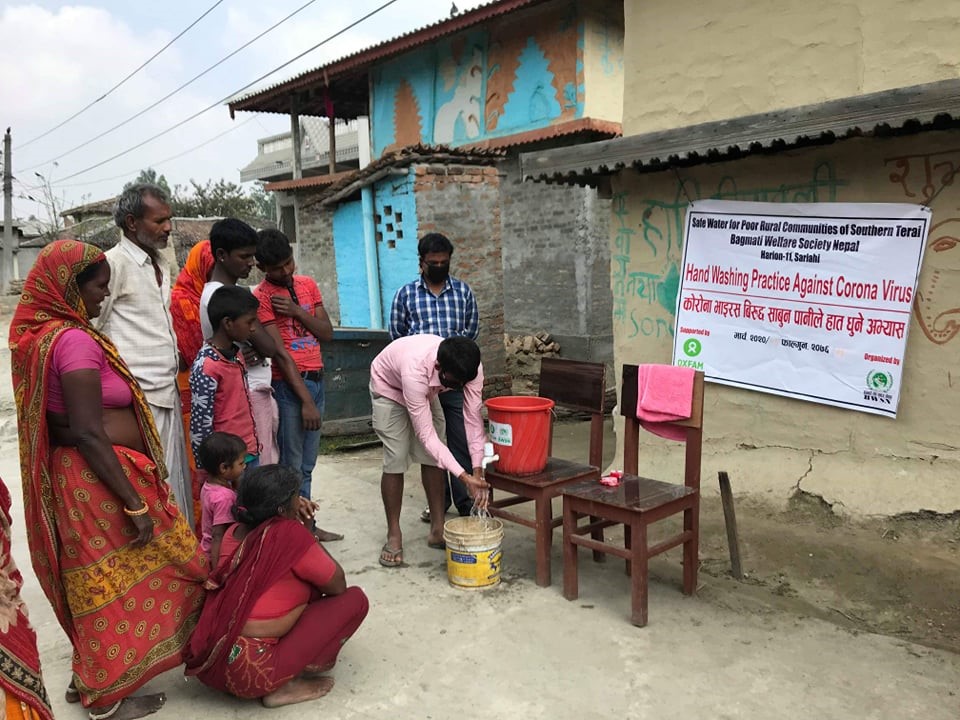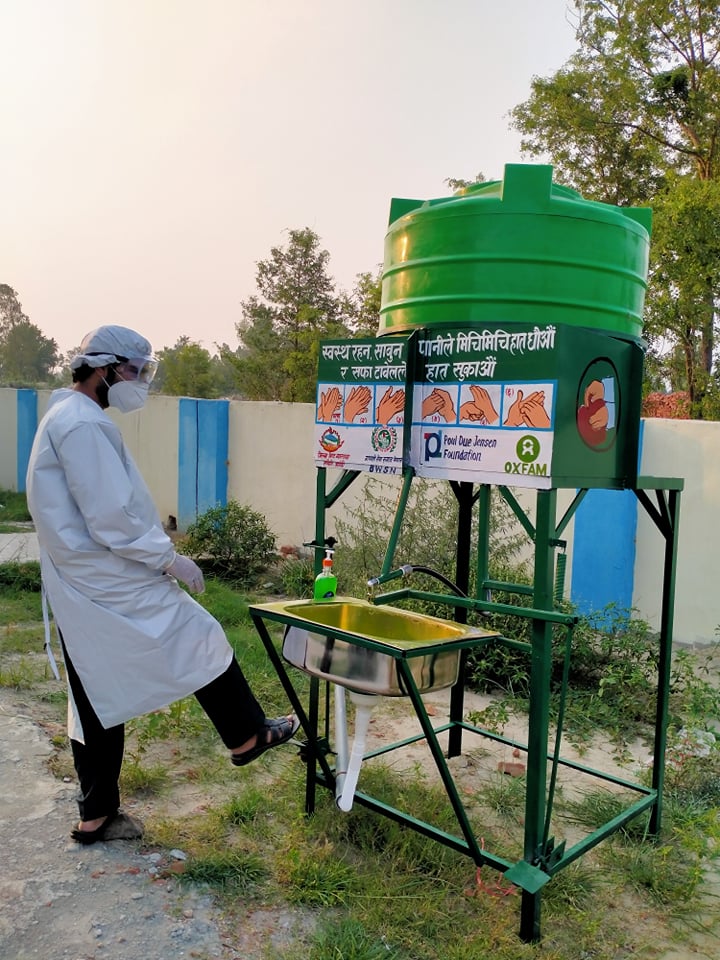Guest post by Lyndsay Stecher, Partnerships, Oxfam GB
Nepal was identified early on as a high-risk country for Coronavirus infection, as it shares multiple open borders with India and neighbours China, which began as the epicentre. It also lacks the infrastructure to handle a large-scale disease outbreak. The pandemic has touched everyone’s lives, but not least those marginalised communities in some of Nepal’s poorest regions, lacking the safe water and sanitation facilities to stay safe.
“The Government of Nepal took various precautions to prevent the spread of disease, including a lockdown and the closure of border points with India and China. They also established quarantine and isolation centres for those with possible cases – including in several of the districts Oxfam works in,” explains Biju Dangol, Safe Water Programme Manager for Oxfam in Nepal.
However with limited government capacity, the state of water access at quarantine centres has been variable, and the toilets, bathing, and handwashing facilities are generally poor. Oxfam’s public health experience also reminded us how challenging it is to effectively change behaviours, even in times of crisis.
Our Response and Innovations
Working quickly through our partnership with the Grundfos Foundation, we have already reached almost 40,000 people through our Coronavirus response in Sarlahi and Rautahat districts. Alongside local partners Rural Development Centre Nepal (RDC) and Bagmati Welfare Society Nepal (BWSN), we have supported 55 quarantine centres, six isolation centres and 12 health care facilities with water, hygiene essentials, and handwashing facilities.
We provided medical personnel and frontline workers with Personal Protection Equipment (PPE), and equipped centres with key supplies like digital thermometers, soap, sanitiser, and surface disinfectant. We supplied contactless handwashing stations connected to a safe water supply, and installed safe, well-ventilated temporary toilets and private bathing units, with separate safe spaces for women and girls.
One of the biggest dangers was misinformation about how the disease is spread and how to stay safe. Oxfam has experience in spreading hygiene messages, but it would be a challenge to spread safety messages in communities under lockdown. However, our local partners RDC and BWSN are already embedded in the community and were able to reach people directly when Oxfam staff could not safely travel.
They used loudspeakers attached to mobile vans to spread key messages in local languages to remote communities – from proper handwashing steps to use of masks and safe social distancing. In key public places (like bazaars), they used microphones to share messages at a safe social distance. We established health desks at quarantine centres as information hubs for dispelling Coronavirus myths, and trained health workers to pass on hand hygiene messages. We also used pamphlets, posters, TV, and radio to get the word out.
We also had to innovate around our hardware. The 55 handwashing stations installed were completely contactless, operated by a foot pump, to reduce any unnecessary touching that could spread the virus. The new handwashing stations received great feedback from the users – that they were both easy to use and made people feel safe.
A Changing Context: New Returnees and New Activities
We started our response with the Grundfos Foundation as soon as the pandemic hit. But unfortunately Nepal is still early on the epidemic curve, with cases still rising.
This is in part because of the approximately 300,000 Nepalese migrant workers who are now returning through the previously closed land border points with India. Returning migrants are at high risk of contracting and spreading Coronavirus, having been in contact with large numbers of people while having little or no access to handwashing stations or safe water. They are required by government to spend 2 weeks in isolation in their home communities, but many are skirting proper processes. Current data shows that 90% of new cases are male, with the highest number of cases seen in youths – further evidence that returning migrants are contributing significantly to the increased number of cases.
We must respond further at healthcare facilities and quarantine centres near the borders to combat the rise in new cases and impact of returning migrants. As such, we are looking to expand our work into Kanchanpur District, another district bordering India, and will work in 3 border crossing points across Sarlahi, Rautahat, and Kanchanpur, as well as in 60 new quarantine centres. Our innovative contactless handwashing stations will be installed at border points, and we will also work with border guards and officials to provide clear Coronavirus messaging.
While we continue the safe water, hygiene, and innovative Coronavirus prevention messaging work, we are also adapting our response as the situation changes on the ground. The latest assessments have shown food support is needed for informal migrant and vulnerable families, who have lost their livelihoods and income as a result of the crisis. Many of these returning migrant workers are from disadvantaged parts of Nepali society (lower castes and marginalised ethnic groups), and there is no government support programme to mitigate the economic impact of the crisis. The markets are still functioning in local areas and cash vouchers will enable vulnerable families to buy food and essentials in a dignified way that also works for the local economy.
Quarantine centres and lockdown conditions also presented increased safety risks to women and girls. As part of the ‘protection cluster’ of humanitarian agencies led by the Nepalese Government, Oxfam identified a high incidence of gender-based violence and harassment in quarantine centres and in communities since the start of the outbreak. This problem is only exacerbated as the negative economic impacts mix with fear and stigma experienced by returning migrants. We will now map the available services to support survivors of gender-based violence, and provide information and access to resources available – including psychosocial counselling and legal support. Our health desks will now act as referral services, directing any survivors to services that can support them. We will provide dignity kits to women, with items including flashlights, sanitary pads, sarees, underwear, and towels.
Biju Dangol reflects on the past few months and the challenging months ahead: “Oxfam, its local partners, and the Grundfos Foundation were able to move quickly to launch an innovative, adaptive Coronavirus response as part of our safe water work in Nepal. We will continue working with local authorities and partners to address the immediate health and social impacts of the virus in the coming months. We will constantly assess and re-assess the situation as it changes, and start to adapt our longer-term interventions in rural communities to ensure we can continue building sustainable water services in even this uncertain context.”



